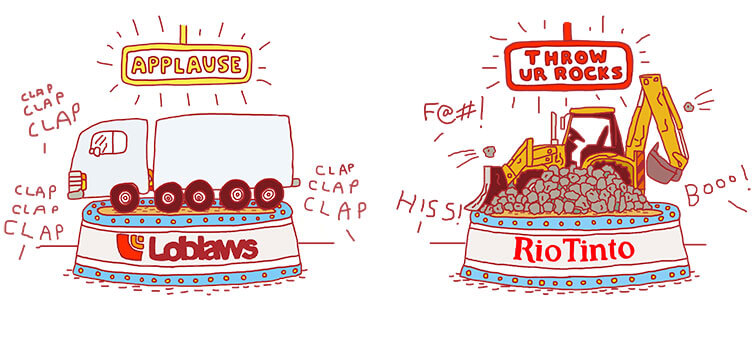Hero:
When the talk turns to electric vehicles, it’s typically about pioneering sedans like the Tesla S, Chevy Bolt and Nissan Leaf. Away from the spotlight however, much of the action is in commercial trucks.
A growing number of fleet operators are going electric, citing more power, lower maintenance costs and fewer emissions-compliance headaches versus their existing diesel vehicles. Among the latest is Loblaw Companies, Canada’s biggest grocery chain, which unveiled plans in early November to switch to an all-electric fleet.
Loblaw officials made the announcement against the backdrop of a 53-foot class-8 truck, the heaviest commercial truck category, made by BYD, the Chinese electric bus and truck maker backed by Warren Buffett’s Berkshire Hathaway.
BYD, which recently announced plans to build a truck plant in Ontario, is one of a string of vehicle and parts makers that are taking a growing interest in electric truck technology.
Even Tesla, best known for its cars, unveiled a battery-operated truck, named the Semi, in November. It claims that the rig can accelerate from zero to 60 mph in just five seconds and reach a speed of 65 mph up a five per cent grade, far faster than its diesel counterparts.
Elsewhere, Cummins, known up to now for its heavy-duty diesel engines, recently showed off a prototype electric powertrain fitted to a class-7 truck.
Loblaw said in an email it plans to add about 350 electric or hybrid trucks and more than 2,500 trailers with the goal of an entirely zero-emissions fleet by 2030.
“We’re working with BYD on specifications and delivery timing,” a spokesperson told Corporate Knights. “In addition to BYD trucks, we have ordered 25 Tesla trucks to be added to our fleet as early as 2019.”
According to Loblaw, the move to an electric and hybrid fleet is “in keeping with our broader carbon-reduction commitment.”
The supermarket chain aims to shrink its carbon footprint by 20 per cent by 2020 and by 30 per cent by 2030, using a 2011 baseline. Besides replacing the trucks, its pollution-reduction plans include centralized energy management, improved truck aerodynamics, less landfill waste and new refrigeration systems that use carbon dioxide as a refrigerant.
Loblaw estimates that removing diesel from its trucks and refrigerated trailers could cut its CO2 emissions by 94,000 tonnes a year – equal to pulling 20,000 cars off the road.
Zero:
A cluster of coal deposits in central Mozambique is bringing no end of trouble to Rio Tinto, the Anglo-Australian mining group, and some of its former top executives.
Besides being a dud investment, the coalfields have landed Rio in hot water with securities regulators over its governance practices. In October, the U.S. Securities and Exchange Commission (SEC) charged the company, its former CEO Tom Albanese and ex-CFO Guy Elliott with fraud for deliberately inflating the value of the Mozambican assets.
“Rio Tinto’s top executives allegedly breached their disclosure obligations and corporate duties by hiding from their board, auditor and investors the crucial fact that a multi-billion dollar transaction was a failure,” Stephanie Avakian, co-director of the SEC’s enforcement division, said in announcing the charges.
The commission is asking U.S. courts to order the return of “allegedly ill-gotten gains plus interest” from the defendants, and to impose civil penalties. It also seeks to bar Albanese and Elliott from serving as public company officers or directors.
Rio has vowed to vigorously defend itself against the allegations. Albanese and Elliott also intend to fight the charges. Meanwhile, the company disclosed in October it had reached a settlement with the U.K. Financial Conduct Authority, including a penalty of 27.4 million pounds.
For all its successes over the past 150 years, Rio has also made some huge mistakes. It bought Montreal-based Alcan, one of the world’s top aluminum producers, for $38 billion (U.S.) in 2007, just as commodity markets were peaking ahead of the 2008 financial crisis. It ended up writing off the bulk of its investment, and Albanese lost his job.
In 2011, Rio bought the Benga coal mine and nearby deposits in Mozambique’s Tete province for $3.7 billion. The project went downhill almost immediately. The coalfield turned out to be smaller and of lower quality than expected, and the Mozambique government rejected Rio’s application to ship the coal to the coast on barges.
Less than three years later, Rio sold the properties to an Indian company for just $50 million.
But, according to the SEC, Albanese and Elliott “sought to hide or delay disclosure of the nature and extent of the adverse developments.” According to the SEC, Rio issued misleading financial statements just days before it raised billions of dollars of debt from U.S. investors.







